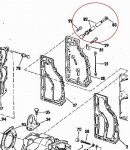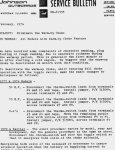jay_merrill
Vice Admiral
- Joined
- Dec 5, 2007
- Messages
- 5,653
So, here's one for y'all.
1972 Johnson 65hp, 3 cylinder. It has been a strong runner despite its age. I launched for a 3rd day of SAR on a case the other day, but had to come back in because it was missing, and would "bog down" at anything over 1/2 throttle. The motor ran fine on the previous outing for about eight hours.
One of the coils was replaced recently but I was about to change the other two anyway, so I pulled them and took them to the OMC dealer to be tested. One was breaking up badly and the other had minimal problems. I bought two new coils and installed them.
On my first test run, the motor still skipped a beat every so often and wouldn't take throttle beyond 50%. Any attempt to advance beyond that point caused the motor to bog down, acting like it was either overloaded with fuel or starving for it.
When I came in, I hooked up my timing light and ran the motor with it attached to each of the spark plug leads, one at a time. All three indicated steady firing with no misses. At this point I started thinking in terms of fuel so I pulled the filter/water separator to see how it looked. There was quite a bit of water in it, but I didn't see any dirt.
Today I took it for another short run (a couple of miles) and brought the timing light. It still bogs down and won't push the boat more than about 8 mph at 2600 rpm. It usually tops out at about 5,000 rpm and 27 mph. The timing light test showed a couple of skips in the middle cylinder, but that problem didn't remain for long. Pulling the plug wires one at a time, and then running under load, suggests that all three cylinders are firing.
The motor is pumping plenty of water and the head is not excessively hot after a few minutes of running under a load. I did a compression test this evening and all three cylinders at great, at about 138 - 140 psi. I am going to pull the fuel pump screen in the morning to see if there is any junk in it and I didn't try to do a "squeeze the bulb" test while underway, because I was alone. The fuel pump is about a year old, having been replaced right after I bought the motor.
My gut is telling me that I have some junk in the carbs but I am wondering just how much could get past a transom mounted filter/separator and the fuel pump screen. I guess there is another part of me that just doesn't want to have to fool with the carbs - I know, dumb but I hate screwing with multi-carb setups.
Anyway, any thought y'all have will be appreciated.
1972 Johnson 65hp, 3 cylinder. It has been a strong runner despite its age. I launched for a 3rd day of SAR on a case the other day, but had to come back in because it was missing, and would "bog down" at anything over 1/2 throttle. The motor ran fine on the previous outing for about eight hours.
One of the coils was replaced recently but I was about to change the other two anyway, so I pulled them and took them to the OMC dealer to be tested. One was breaking up badly and the other had minimal problems. I bought two new coils and installed them.
On my first test run, the motor still skipped a beat every so often and wouldn't take throttle beyond 50%. Any attempt to advance beyond that point caused the motor to bog down, acting like it was either overloaded with fuel or starving for it.
When I came in, I hooked up my timing light and ran the motor with it attached to each of the spark plug leads, one at a time. All three indicated steady firing with no misses. At this point I started thinking in terms of fuel so I pulled the filter/water separator to see how it looked. There was quite a bit of water in it, but I didn't see any dirt.
Today I took it for another short run (a couple of miles) and brought the timing light. It still bogs down and won't push the boat more than about 8 mph at 2600 rpm. It usually tops out at about 5,000 rpm and 27 mph. The timing light test showed a couple of skips in the middle cylinder, but that problem didn't remain for long. Pulling the plug wires one at a time, and then running under load, suggests that all three cylinders are firing.
The motor is pumping plenty of water and the head is not excessively hot after a few minutes of running under a load. I did a compression test this evening and all three cylinders at great, at about 138 - 140 psi. I am going to pull the fuel pump screen in the morning to see if there is any junk in it and I didn't try to do a "squeeze the bulb" test while underway, because I was alone. The fuel pump is about a year old, having been replaced right after I bought the motor.
My gut is telling me that I have some junk in the carbs but I am wondering just how much could get past a transom mounted filter/separator and the fuel pump screen. I guess there is another part of me that just doesn't want to have to fool with the carbs - I know, dumb but I hate screwing with multi-carb setups.
Anyway, any thought y'all have will be appreciated.





















